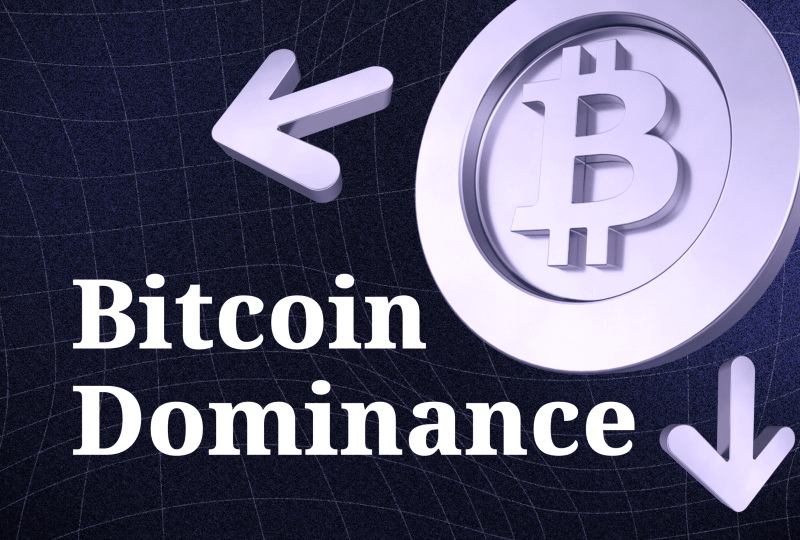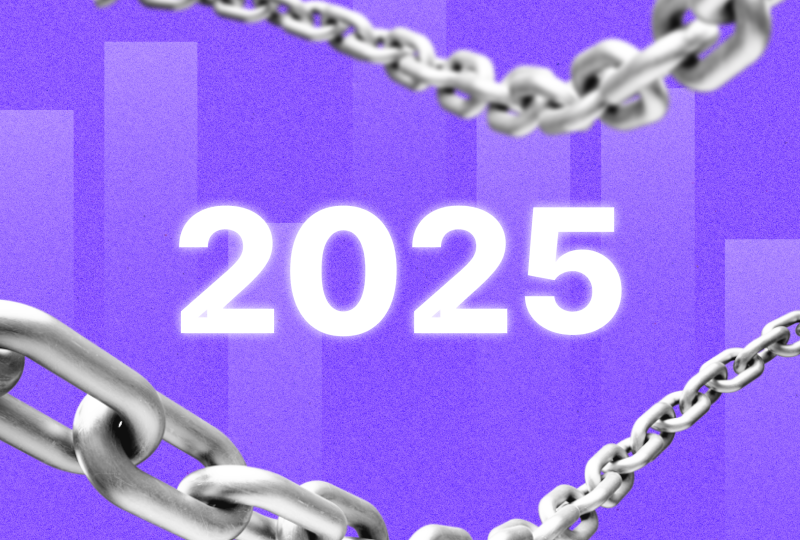DeepSeek vs ChatGPT: Which AI Technology is Better For You?
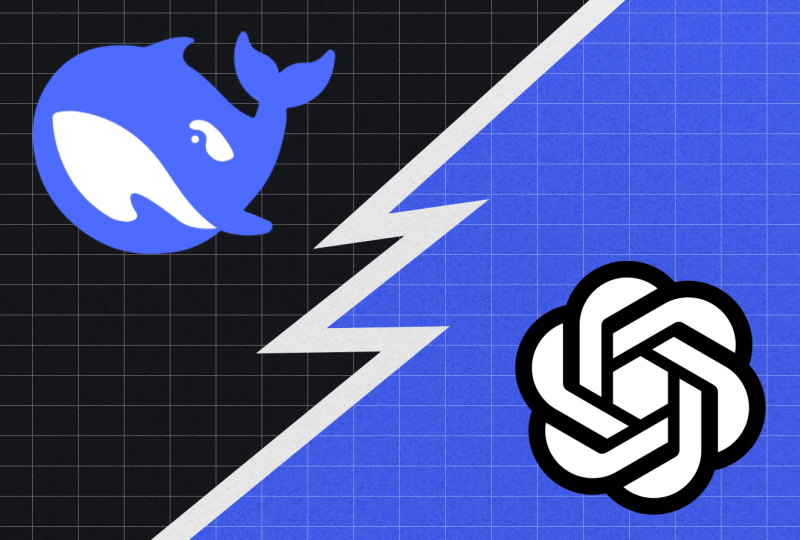
The battle of AI intensifies as the Chinese artificial intelligence software company puts out a solid competitor for OpenAI’s ChatGPT.
The DeepSeek news regarding its comparable performance and significantly low development cost circulated around the industry, causing major AI stocks to tumble.
This competition benefits businesses, developers, and individuals, offering more advanced tools and broader options to automate tasks and improve decision-making.
The main question now is: which one is better? Let’s find out from this comprehensive DeepSeek vs ChatGPT breakdown.
Key Takeaways
- ChatGPT is a generative and conversational AI designed to provide human-like texts and images based on the user’s input.
- DeepSeek is a domain-specific AI assistance that pulls and provides information from high-authority sources.
- Businesses integrate ChatGPT into their workforce software and systems to support task automation and generate content.
- Professionals and scholars use DeepSeek to access up-to-date information aiding their work or research.
DeepSeek vs ChatGPT: AI Industry Growth
While ChatGPT overtook conversational and generative AI tech with its ability to respond to users in a human-like manner, DeepSeek entered the competition with quite similar performance, capabilities, and technology.
Many of these breakthroughs are driven by advancements in natural language processing (NLP) and machine learning (ML). According to Statista, the global AI industry is expected to grow four times than today’s valuation. The market size was estimated at $184 billion in 2024, exhibiting a 27.46% CAGR, potentially reaching $826 billion by 2030.
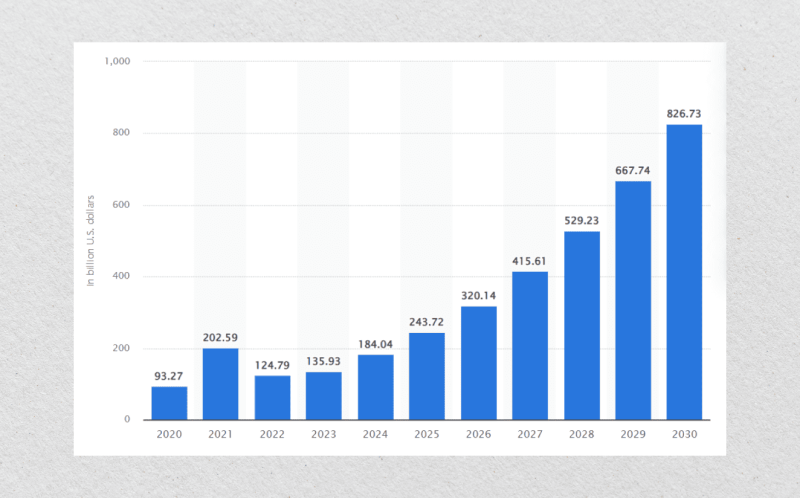
Conversational and generative are two prominent types that AI models try to achieve. ChatGPT utilizes conversational AI models in its bilateral response approach and ability to use human voice and texts, while generative AI models provide images and videos from textual input.
This growth is fueled by the increasing demand for AI-powered chatbots, virtual assistants, and customer service automation across various industries, including healthcare, retail, and finance.
Both sectors are growing massively, with generative models expected to reach a $100 billion valuation in 2026 and over $350 billion in 2030.
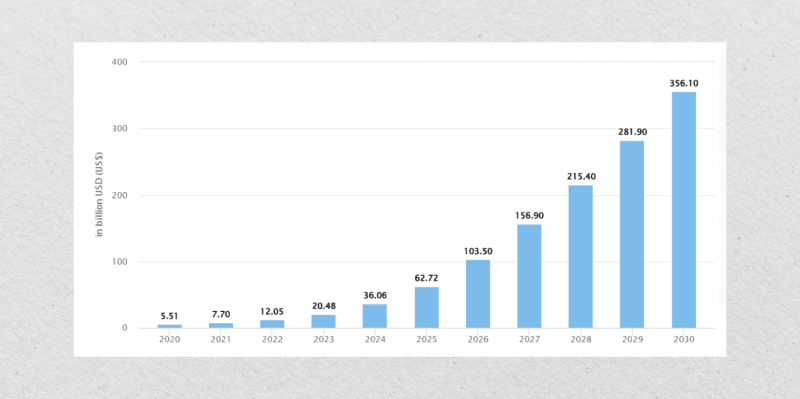
ChatGPT is one of the most well-known conversational AIs. It enables users to automate communication, generate content, and assist with inquiries. DeepSeek, on the other hand, focuses more on domain-specific applications. It offers AI-driven research, data retrieval, and industry-specific insights.
With industry applications ranging from customer service to knowledge management, both AI tools are redefining how humans interact with machines.
ChatGPT Overview
ChatGPT, developed by OpenAI, is a conversational AI based on the GPT-3 and GPT-4 architectures. It has gained massive popularity due to its ability to generate human-like text on a wide range of topics, making it one of the best AI writing tools available.
As of 2023, OpenAI’s valuation was estimated at $29 billion, with ChatGPT playing a key role in its rise.
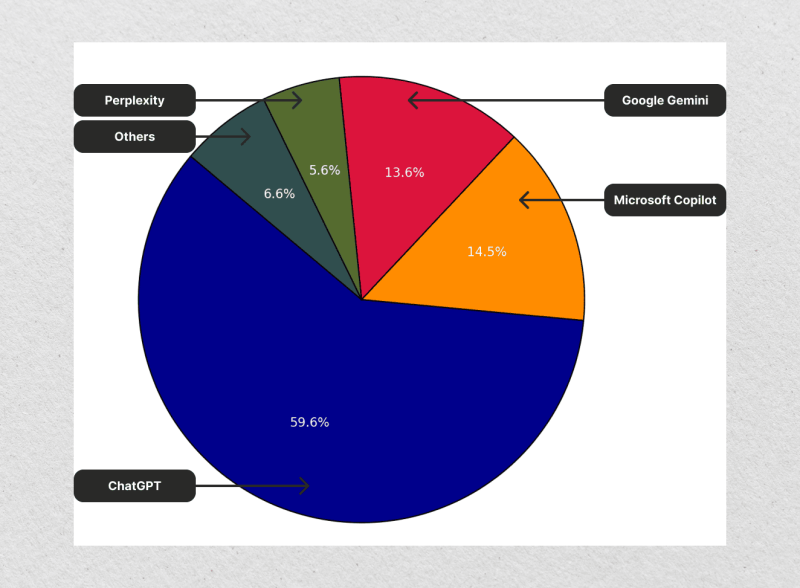
Core Features
- Natural Language Understanding: ChatGPT is trained on diverse datasets, enabling it to respond to various inputs.
- Generative Capabilities: It produces human-like responses applicable to content creation, customer service, and more.
- Code Assistance: It helps with coding tasks, debugging, and even providing coding explanations for developers.
- Educational Use: ChatGPT offers tutoring and information on numerous topics, making it a good source for different professions.
ChatGPT has had a profound impact on industries that rely on conversational AI. As per Fortune Business Insights, the conversational AI market is expected to reach over $60 billion by 2032 from currently estimated $12 billion.
DeepSeek Overview
DeepSeek was founded in 2023 by Liang Wenfeng, a graduate of Zhejiang University and co-founder of the hedge fund High-Flyer. The company operates as an independent AI research lab under the umbrella of High-Flyer.
It is an AI-driven platform that specializes in research, real-time data retrieval, and domain-specific insights. Unlike the pure conversational AI capabilities that ChatGPT uses, DeepSeek is designed to cater to professionals and businesses in industries such as healthcare, law, and academia.
Core Features
- Specialized Search Engine: Providing information from medical databases, legal journals, and academic papers.
- Advanced Machine Learning: It uses custom algorithms for data mining, ensuring accurate and contextually relevant results.
- Real-Time Updates: DeepSeek ensures that users receive the latest available information from trusted, high-authority sources.
- Integration with Industry Tools: Its AI model connects with enterprise solutions for law, research, and other industries.
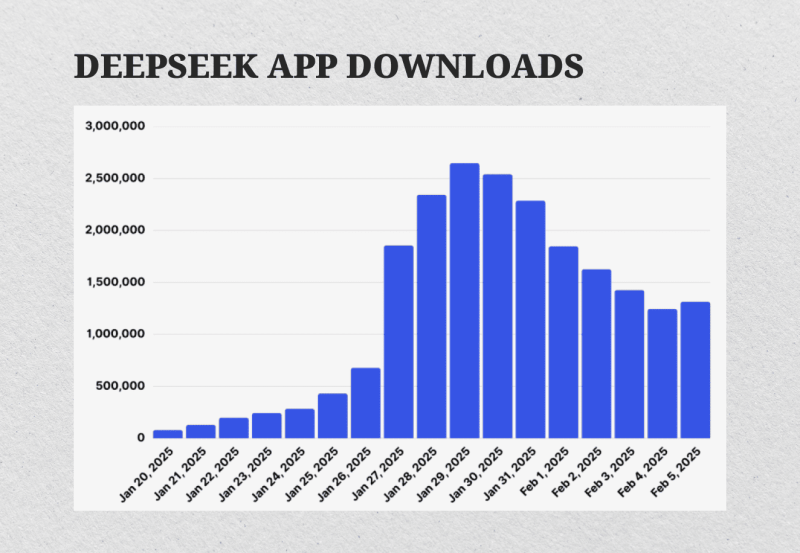
As such, DeepSeek has found itself a specific niche in this booming market, providing professionals with insights and tools that drive decision-making. For example, AI in healthcare is growing massively, reaching nearly $50 billion in valuation, with a significant CAGR of 49%.
DeepSeek vs ChatGPT Comparison
While ChatGPT and DeepSeek are powered by AI, they serve different niches within the AI space. ChatGPT excels in natural language processing and general-purpose applications, while DeepSeek focuses on delivering precise, industry-specific insights.
This DeepSeek vs ChatGPT breakdown will explore their strengths and weaknesses across various aspects.
Fast Fact
ChatGPT has an average of around 123 million daily active users, while DeepSeek reported an average of 22.2 million DAUs in January 2025.
Technology and Algorithms
ChatGPT: Powered by GPT-3 and GPT-4 models and built on the transformer architecture. The GPT series uses deep learning to understand and generate text by predicting the next word in a sequence based on a huge dataset.
ChatGPT’s capabilities extend beyond mere conversations, performing complex tasks like summarizing, translating, and transforming texts. It uses human feedback to reinforce learning and refine its responses, aligning it with user expectations.
DeepSeek: DeepSeek leverages advanced AI techniques and custom-built algorithms to power its real-time information retrieval. Its technology prioritizes quality over quantity, offering deeper insights within particular industries.
It uses a combination of natural language understanding and machine learning models optimized for research, providing users with highly accurate, context-specific responses.
DeepSeek is designed to handle large-scale data analysis, especially those pertaining to academic papers, legal documents, and medical research.
Both platforms use sophisticated AI technology. However, ChatGPT is more flexible and broadly applicable, while DeepSeek tailors its models to provide highly specific, relevant results within specialized sectors. Your choice depends on your objective and work scope.
Performance and Accuracy
ChatGPT: ChatGPT performs perfectly in generating human-like and contextually appropriate texts due to its training on diverse datasets and ongoing machine learning process.
However, it is prone to “hallucinations,” where it can generate plausible but incorrect information. This happens due to insufficient training data or incorrect assumptions made by data biases during learning.
While it may struggle with highly technical or heavily unclear inputs, its accuracy in general knowledge is impressive, making it a go-to tool for many users seeking broad, conversational AI assistance.
DeepSeek: In contrast, DeepSeek strives for accuracy and reliability, especially in specific sectors like medicine, law, and research. It is designed to skim through vast amounts of domain-specific data and sources to provide precise, well-sourced answers.
DeepSeek’s ability to access and analyze specialized datasets makes it a highly reliable platform for users who need authoritative knowledge. It excels at providing factually correct, context-sensitive results, minimizing the risk of errors compared to more generalist models.
ChatGPT is more versatile but can be inaccurate in niche or highly technical areas, with some misinformation occurrences. DeepSeek’s domain focus makes it more reliable in delivering accurate, specialized information. For general conversational use, ChatGPT is a solid option, but for industry-specific research, DeepSeek is more reliable.
Interfaces and User Experience
ChatGPT: The user interface is straightforward and user-friendly. It is accessible through the mobile application or web version, with clean and clear instructions that prioritize conversation.
Users can directly engage in back-and-forth interactions, writing prompts, and receiving responses, while the AI quickly adapts to different tones and topics.
It can be integrated with third-party applications like Microsoft Suits and Slack to extend its functionality and incorporate AI into existing workflows.
DeepSeek: While its interface is similarly easy to use, it is more specialized, reflecting its focus on research and specific queries. It offers powerful filtering tools that slightly differ from ChatGPT’s open-ended conversational style, allowing users to refine and improve their search.
This approach offers researchers and professionals a more structured interface, helping them navigate vast datasets and academic or industry-specific databases more effectively.
It provides an API for integrating with existing workflows. However, this is best done through AI platforms like Relay.app, connecting with Trello, Shopify, Salesforce, and more.
ChatGPT’s user experience is ideal for casual and business users alike. DeepSeek is tailored to professionals in specific fields who need precise research support. ChatGPT is better for everyday interactions, while DeepSeek provides a more focused, data-driven experience.
Fast Fact
By January 2025, the ChatGPT mobile application had been downloaded over 350 million times, while DeepSeek’s app had been downloaded 21 million times across Google Play and the App Store as of February 2025.
Integration and Ecosystem
ChatGPT: ChatGPT is integrated with a wide range of applications and workforce software, such as Microsoft Word, Teams, and Slack, allowing businesses and employees to automate complex tasks. It also integrates with other OpenAI products, such as DALL·E for image generation, to provide a more comprehensive experience.
Developers can leverage the platform’s API structure to build custom applications that support various functionalities, such as automated customer support, content generation, and brainstorming.
ChatGPT’s versatility makes it ideal for organizations and users across different industries, from tech startups to large corporations.
DeepSeek: On the other hand, DeepSeek focuses on integration with industry-specific tools. For example, it may connect to legal databases, medical archives, or academic journals to offer real-time, specialized data retrieval.
Its API allows enterprises to tailor the platform to their specific needs, whether it is for research, legal analysis, or data mining. While DeepSeek’s integrations are more niche, they are highly valuable to professionals who require precise and authoritative information.
Both provide API access, but ChatGPT is more versatile for general use, whereas DeepSeek excels in tailored integrations for specialized industries. ChatGPT offers a scalable ecosystem for general business integrations, while DeepSeek serves more specific sectors.
Models and Pricing Plans
ChatGPT: ChatGPT has free and paid plans. The free version provides access to GPT-3, a light model that offers fast reasoning and balances speed and efficiency. It is suitable for receiving quick, intelligent answers.
The premium “ChatGPT Plus” plan unlocks access to GPT-4, offering more advanced capabilities and understanding. While you can access this model for free, there are limited messages and capacity.
For unlimited access, faster response times, and additional features, ChatGPT Plus costs $20 per month, which is quite affordable for businesses and developers looking to get an enterprise-level AI solution.
DeepSeek: There are four models: V2, V3, R1, and DeepSeek-Coder, and the pricing structure varies based on the scope of usage and the industry it serves.
The free models include R1, an open-source for general AI tasks, research, and academic applications, while the V3 is an improved AI-generating model with advanced reasoning and coding abilities that is compared to ChatGPT-4.
Moreover, DeepSeek-Coder is a free AI-powered coding assistant for developers that supports code generation, completion, and debugging.
Finally, V2 is a general-purpose natural language processing model that performs multiple tasks, from conversational AI to content creation and complex reasoning tasks.
Its pricing considers usage volume, with input tokens ranging from $0.07 to $0.27 per 1 million tokens and output tokens around $1.10 per 1 million tokens.
ChatGPT and DeepSeek offer free access to generic AI models with limited experience in text and information generation. However, ChatGPT’s premium payment is more straightforward than DeepSeek’s token-based subscription model.
Applications and Use Cases
ChatGPT: ChatGPT is versatile and suitable for various applications that support customer service, content creation, productivity, and education.
Its flexibility makes it ideal for communication automation, content ideation, article generation, coding assistance, and providing personalized tutoring for internal and external users.
ChatGPT’s conversational dynamics make it an all-in-one AI assistant for tech firms, marketing agencies, supply chain management companies, and others.
DeepSeek: DeepSeek focuses on delivering accurate and in-depth insights for professional users and large-scale business activities in healthcare, law, and academia.
Its real-time information retrieval allows users to access broad datasets and specialized sources more easily. As such, researchers, scholars, experts, and legal professionals rely on DeepSeek to find the most relevant and up-to-date information that serves their purposes.
ChatGPT is ideal for general conversational tasks and content generation, while DeepSeek is best for industry-specific applications like research and data analysis.
Ethical Considerations
ChatGPT: Like most artificial intelligence technologies and models, ChatGPT has ethical concerns about bias, reliability, content moderation, and misinformation.
This happens because the AI systems are trained on vast datasets, which can unintentionally include societal biases, leading to skewed outputs.
While OpenAI continuously implements safeguards to reduce offensive content, ChatGPT is still prone to “hallucinating” and misinformation, requiring users to fact-check responses.
Another concern is the model’s inability to distinguish between credible and non-credible sources, which makes it unreliable in professional or academic contexts.
DeepSeek: The industry-specific focus raises ethical concerns about data privacy and output accuracy, especially when making decisions on multi-million investments.
Since DeepSeek provides AI assistance to specialized areas, providing outdated or biased information to law, healthcare, or academic research can have serious damage.
Therefore, DeepSeek must ensure that the data it pulls is ethically sourced, up-to-date, and compliant with industry standards.
Both platforms have ethical challenges in different ways. ChatGPT’s general AI can produce biased or incorrect content, while DeepSeek’s niche focus demands stricter data integrity and privacy measures.
Future Developments
ChatGPT: OpenAI plans to refine ChatGPT by improving its contextual understanding and reducing its tendency to hallucinate incorrect information.
The next iterations, possibly GPT-5 and beyond, will likely include multimodal capabilities, allowing the AI to process not only text but images and even videos.
Additionally, with more AI regulation in place, OpenAI will likely adapt ChatGPT to align with global ethical standards, such as ensuring fairness, transparency, and privacy in its responses.
DeepSeek: DeepSeek will continue fine-tuning its specialized algorithms to improve the accuracy and depth of its industry-focused insights. The developers may integrate more sophisticated data mining techniques to enhance its ability to provide real-time, high-authority information.
DeepSeek could expand its database integration to improve AI adoption in professional sectors like healthcare and law and cover more specialized knowledge bases, such as finance or engineering.
ChatGPT is more likely to enhance versatility and improve its contextual shortcomings in the future, while DeepSeek will probably continue expanding its industry-specific knowledge and precision.
Advantages and Disadvantages
While both AI models are top trending in the artificial intelligence space, exhibiting highly reliable assistance, advanced automation capabilities, and cutting-edge technologies, they contain some shortcomings. Let’s explore the DeepSeek vs ChatGPT benefits and challenges in this breakdown.
ChatGPT: Pros
- Versatility: ChatGPT is suitable for various applications, from content generation to customer service.
- User-Friendly UI: The interfaces are easy to use for both developers and non-tech-savvy users.
- Broad Knowledge Base: Comprehensive understanding of a large number of topics, making it ideal for general inquiries.
- Scalable: ChatGPT can integrate with various platforms and workflow software, enhancing productivity in multiple industries.
ChatGPT: Cons
- Misinformation: ChatGPT can generate convincing but incorrect information (hallucination), especially in niche or technical topics.
- Context Limitations: The model may struggle with maintaining long-term contextual understanding in multi-turn conversations.
- Biases: Biases may present in the data it is trained on, leading to skewed or inappropriate responses.
- Dependence on Prompts: The quality of its output relies on how well a prompt is inserted, limiting its ease of use in complex tasks.
DeepSeek: Pros
- Domain-specialty: DeepSeeks provides highly accurate and relevant insights in specific industries like healthcare and law.
- Real-Time Data: The model’s AI algorithms offer access to the latest, real-time information from specialized sources.
- Deep Search Capabilities: DeepSeek’s models are superior at handling complex queries requiring precise data retrieval.
- Advanced Integration: It works seamlessly with professional and industry-specific software, enhancing its institution-level utility.
DeepSeek: Cons
- Limited General Use: Unlike ChatGPT, DeepSeek is specialized and may not be suitable for general conversational AI tasks.
- Steep Learning Curve: Due to niche focus, users may need time to familiarize themselves with specialized features and databases.
- Narrower Audience: As DeepSeek primarily serves professionals in specific fields, it has a relatively lower user base.
- Higher Cost: The paid version can be more expensive, especially for enterprise-level use, limiting accessibility for small businesses.
Verdict: Which One Shall You Use?
Comparing DeepSeek vs ChatGPT and deciding which one to choose depends on your objectives and what you are using it for. Both tools offer exceptional value within their niches, and the decision ultimately comes down to whether you need broad capabilities or highly specialized, precise data.
If you are looking for a versatile, generic AI that can handle multiple tasks, from customer support to content generation, ChatGPT is a solid option.
It is trained on a broad range of datasets, and its conversational model is designed to generate human-like texts and responses.
However, if you are looking for an AI tool to aid your academic research or professional career, like in healthcare, DeepSeek is more suitable for you. It provides real-time information retrieval from authoritative sources.
FAQ
Is DeepSeek free?
Yes. It offers free access to some models, such as DeepSeek-V3 and DeepSeek-R1, but with some limitations in research capacity. Paid plans apply to DeepSeek-V2 and DeepSeek-Coder, which are advanced programming and automation platforms.
Is ChatGPT cheaper than DeepSeek?
The DeepSeek vs ChatGPT cost comparison depends on usage. GPT-4o and DeepSeek-V3 are free with some limits. However, ChatGPT Plus charges a one-time $20/month, while DeepSeek premium payment depends on token usage.
Is DeepSeek safe?
Yes, for the most part. The company follows standard AI safety guidelines, including content filtering and moderation. However, it may lack the same extensive security infrastructure. As with any AI, responsible usage and privacy considerations are essential.
is DeepSeek better than ChatGPT?
For general users, ChatGPT is better, but researchers may prefer DeepSeek. ChatGPT-4o excels in third-party integrations, conversational fluency, and enterprise adoption, while DeepSeek models focus on efficiency, multilingual capabilities, and open-source development.
